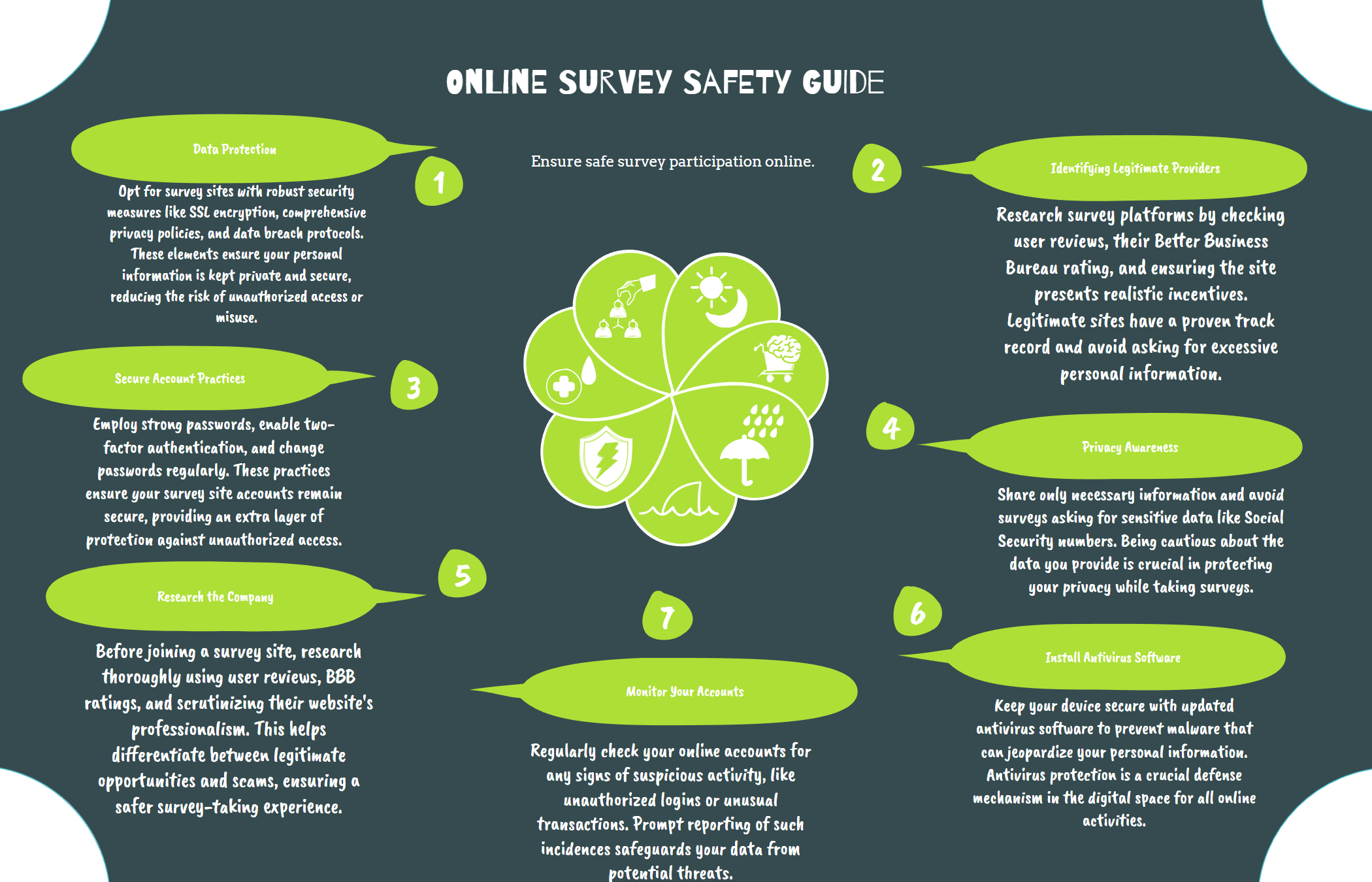In today’s digital age, online surveys have become a popular way to earn extra cash or gift cards. However, with the rise of cybercrime and data breaches, it’s crucial to prioritize your safety when participating in online surveys. This ultimate guide to survey site safety will walk you through essential steps to protect your personal information and ensure a secure survey-taking experience.
What Are the Key Elements of Survey Site Safety?

When it comes to participating in online surveys, safety should be your top priority. Key elements of survey site safety include:
Data Protection
Reputable survey sites employ robust security measures to safeguard your personal information. Key aspects include:
- Encryption Technologies: Look for sites that use SSL (Secure Sockets Layer) encryption.
- Privacy Policies: Always check their privacy policies to understand how to handle data.
- Data Breach Protocols: Ensure they have protocols for responding to data breaches.
Identifying Legitimate Survey Providers
Not all survey sites are created equal. To identify legitimate providers, consider:
- Established Platforms: Stick to well-known platforms with positive reviews.
- Track Record: Look for sites with a history of timely payments.
- Realistic Rewards: Be wary of sites promising unrealistic rewards or asking for excessive personal details.
Secure Account Practices
Protecting your accounts is crucial. Implement these practices:
- Strong Passwords: Create strong, unique passwords for each account.
- Two-Factor Authentication: Enable two-factor authentication whenever possible.
- Regular Password Changes: Change your passwords regularly for enhanced security.
Privacy Awareness
Being mindful of the information you share in surveys is essential. Remember:
- Legitimate surveys rarely ask for sensitive data like Social Security numbers.
- If a survey seems overly intrusive, it’s best to skip it.
“Always trust your instincts. If a survey site seems too good to be true or makes you uncomfortable, it’s wise to steer clear.”
How Can You Identify Legitimate Survey Sites?

Distinguishing between genuine survey opportunities and potential scams is crucial for your online safety. Here’s how to spot legitimate survey sites:
Research the Company
Before signing up, conduct thorough research:
- User Reviews: Check reviews from other users on independent platforms.
- Better Business Bureau Rating: Verify their rating with the BBB.
- Professional Website: Ensure they have a professional website with clear contact information.
Check for Transparency
Legitimate survey sites are upfront about their operations. Look for:
- Clear Reward Structures: Understand how you earn rewards and when payments are made.
- Detailed FAQs: A comprehensive FAQ section indicates transparency.
- Realistic Promises: Be cautious of vague claims about earnings.
Verify Payment Methods
Reputable survey sites offer secure payment options. Consider these methods:
- PayPal: A widely accepted method that offers buyer protection.
- Direct Bank Transfers: Ensure these are secure and traceable.
- Gift Cards from Well-Known Retailers: Often safer than cash payments.
Industry Affiliations
Many legitimate survey companies are members of market research associations such as:
- ESOMAR
- Insights Association
These affiliations indicate a commitment to ethical practices and data protection standards.
What Online Survey Security Measures Should You Implement?

Protecting yourself while participating in online surveys requires proactive measures. Here are essential security steps:
Use a Dedicated Email Address
Create a separate email account specifically for survey activities. This helps keep your primary email secure and organized.
Install Antivirus Software
Keep your device protected with up-to-date antivirus software. This guards against malware that could compromise your personal information.
Be Cautious with Personal Information
Only provide the minimum necessary personal details required for survey participation. Be especially wary of surveys asking for sensitive information like full addresses or financial data.
Use Virtual Private Networks (VPNs)
Consider using a VPN when participating in online surveys to add an extra layer of privacy and security to your internet connection.
How Can You Protect Your Personal Information in Surveys?
Safeguarding your personal data is paramount when engaging with online surveys. Follow these best practices:
Read Privacy Policies
Take the time to review privacy policies before signing up. Understand how they collect, use, and protect your data.
Limit Information Sharing
Only provide the minimum amount of personal information necessary. If a survey asks for details you’re uncomfortable sharing, skip it.
Monitor Your Accounts
Regularly check your accounts for suspicious activity. Report any unauthorized access or unusual transactions immediately.
Use Secure Connections
Avoid completing surveys on public Wi-Fi networks. If you must use public internet, ensure you’re connected through a VPN for added security.
“Your personal information is valuable; protect it as you would in the real world.”
What Are Safe Survey-Taking Practices?
Adopting safe habits when participating in online surveys can significantly reduce risks. Here are some best practices:
Set Realistic Expectations
Understand that legitimate surveys typically offer modest compensation. Be skeptical of sites promising large payouts for minimal effort.
Stay Informed About Scams
Keep yourself updated on potential scams by following these steps:
- Subscribe to consumer protection newsletters.
- Follow reputable tech blogs covering cybersecurity issues.
- Join forums discussing experiences with various survey sites.
Trust Your Instincts
If something feels off about a survey or website, trust your gut and avoid participating. It’s better to miss out than compromise your personal information.
Report Suspicious Activities
If you encounter suspicious surveys or websites, report them to the appropriate authorities or consumer protection agencies. This helps protect others from potential scams.
Navigating the world of online surveys can be rewarding, but it’s essential to prioritize safety and data protection. By following this survey site safety guide, you can enjoy the benefits of participating in online surveys while minimizing risks to your personal information and financial well-being. Stay vigilant, use secure practices, and prioritize privacy when engaging with online survey platforms.
FAQ Section
Are online surveys safe?
Online surveys can be safe using reputable sites and following best practices for protecting personal information. Always research the company, use strong passwords, and be cautious about sharing sensitive data.
How can I tell if a survey site is legitimate?
Look for transparent information about the company, check user reviews, verify payment methods, and see if they’re affiliated with recognized market research associations. Legitimate sites will also have clear privacy policies and terms of service.
What personal information is safe to share in online surveys?
Generally, it’s safe to share basic demographic information like age, gender, and general location. However, avoid sharing sensitive details such as full addresses or financial account information.
What should I do if I suspect a survey site is a scam?
If you suspect a survey site is fraudulent, stop using it immediately. Report it to consumer protection agencies and alert your bank or credit card company if you’ve shared any financial information. Consider changing passwords for any compromised accounts.

